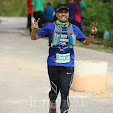 |
| The legend with his world record in Berlin Marathon 2007 |
Check your health
Before you start training for a marathon, go to the doctor and have a thorough examination. I go to the doctor every six to eight weeks to see if my form has changed, and I take this opportunity to have a general check-up. Older runners who may be at risk for heart and circulatory diseases should get the okay of a doctor before starting training.Set goals
I know what I want when I start a marathon: to win! But what do you want? Make sure you're clear in advance and don't go out too fast. If you set a time goal, whatever it is, it should be realistic. If I run for a world record, I just don't take off; I set definite time goals during the race. My goal time is based on times that I've run previously over shorter distances. Do the same, or use the results of friends who are at the same level.Increase endurance
When I ran my first marathon at 15, I had lots of talent and speed, but one thing was lacking: endurance. I've worked on that over the years with thousand of slow kilometres. To run a successful marathon, you have to run great distances - these can't be replaced by a quick, fast workout. The core of marathon training is the long slow run. The capacity of your body to take in oxygen increases. The more oxygen you have available for energy, the higher your endurance.Include breaks
Believe it or not, I need a break once in a while. I have to rest if I want to go fast on other days. My marathon training is organized so that I really challenge one day and then follow it up the next day with a recovery run. It should be the same for you. For every marathoner; have at least one complete rest day a week when you don't run.Kick up the pace
I got my marathon world record with an average speed of 20km/hr, which is faster than my usual pace. I trained at this "race pace" before the marathon; at first for short, then over longer distances. Are you a beginner? Then it's enough to run a marathon at your usual pace. If you've got more ambition (3:30 or faster) you have to assume your marathon pace will be faster than usual. You need to practise it in training for 10 miles (~16k).Lift some weights
I spend a lot of time in the weights room. It's not about muscle building for me, but about increasing endurance by using lighter weights. My marathon training includes regular strength training for all of the relevant muscle groups. Do a few planks, press-ups and crunches - perhaps directly after a long run.Excerpt from "How can I run like the best?" (Runner's World Coach)


0 comments:
Post a Comment